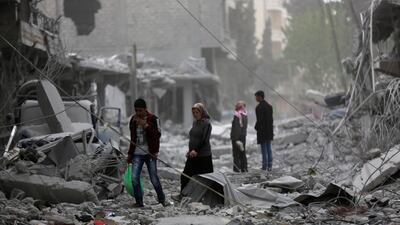There continues to be considerable disagreement over whether the conflict in Syria is nearing an end or whether it has morphed into a regional struggle that will bring more dangers to the country. Whatever the answer, the place where developments may be most far-reaching is northern Syria, where Turkish troops are deployed in a large area between Afrin and Jarablus.
The reason for this is that the Turkish plans for northern Syria appear to include two components: control over large swathes of land, coupled with a potential desire to send a large number of the three million Syrian refugees currently living in Turkey into these occupied areas to populate them. Ankara is laying the groundwork for a large zone of influence inside Syria, one that can be protected by Turkey’s armed forces and that can potentially be used to mobilise the refugee population.
From the Turkish perspective, such a zone would serve three main purposes. It would reduce Turkey's refugee burden by establishing a territory where many refugees can be resettled; it would allow the Turks to build up local military forces that could help block any resurgence of hostile Kurdish forces and it would give Ankara leverage to possibly destabilise the Assad regime and perhaps impose a post-war settlement that it favours.
Some have speculated that Turkey might go further than that and attempt to annex Syria's border areas in some kind of neo-Ottoman impulse. That's far from certain, however, and might indeed miss the point. What Turkish President Recep Tayyip Erdogan seeks is a major say in what happens in Syria and control over a large stretch of the Turkish-Syrian border would provide him with such latitude.
In light of this, President Donald Trump's remarks last week that the United States would soon pull out of Syria could be very relevant. While the Pentagon seemed surprised at Mr Trump's statement, it could be that the US president sees Turkish ambitions as an opening to withdraw from Syria. Not only would a Turkish-backed presence deny Bashar Al Assad and his Iranian allies the means to control northern Syria, it could keep in check any ISIL revival.
A Turkish deployment in northern Syria could also have implications for what happens in Idlib, the last major area outside the regime’s control. There was speculation when the Turks entered Afrin that a deal had been reached between Turkey and Russia, whereby Russia would look the other way on the Turkish intervention in exchange for Turkey’s allowing the Assad regime and Russia to re-conquer Idlib.
For now, that has not happened – and can such a quid pro quo actually hold further down the road? By helping insurgents in Idlib to resist a regime offensive, Turkey could gather strong cards to shape a political endgame in Syria. This might put its relationship with Russia under stress but Russian President Vladimir Putin must have known this was possible when he invited Turkey to participate in the Astana process, which implicitly recognises Turkey’s and Iran’s stakes in Syria.
The population factor will alarm the Assad regime. Among the millions of Syrian refugees in Turkey there is a pool of young men who could be recruited into a militia under Turkish sponsorship, one that could push down from the north. If that were to happen, it could transform the landscape of the Syrian conflict. Whether such a scenario is one Turkey prefers is unknown but even the possibility of this happening will greatly increase Turkish political leverage.
In 1998, Syria was compelled to accept the Adana Agreement with Turkey and abandon its support for the Kurdistan Workers Party, or PKK. At the time, Turkish special forces were operating against the PKK dozens of kilometres inside Syrian territory in the area of Kamishli. Then president Hafez Al Assad understood that Syria was vulnerable in its border regions, because their mixed populations and economic ties with neighbouring states had always made Damascus’ influence there more tentative than elsewhere.
That pattern continues today. Mr Al Assad is just as keen to regain the areas of Deir Ezzor and Hasakeh in the north-east and Deraa in the south as he is northern Syria, because the stability of his regime will depend on his being able to neutralise threats from these outlying regions. That he maintained a strong intelligence presence in all of these places before the 2011 uprising only underscored how important he considered them to the regime’s durability.
Turkey knows this, as does Russia. Mr Putin had no choice but to integrate Mr Erdogan into the Astana talks, given Turkey’s access to the Syrian border. However, this could be something Mr Al Assad could come to regret if the Turks decide to exploit their gains to undermine him. With the Syrian regime’s depopulation policies leading to the creation of millions of refugees, the Syrian regime may be slowly filling a reservoir in which it can ultimately drown.



